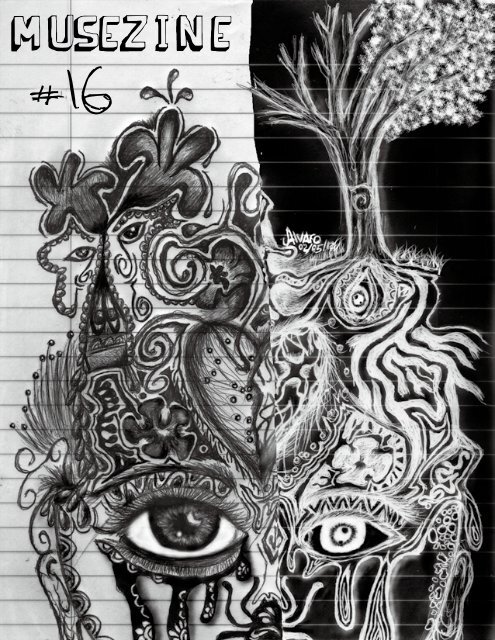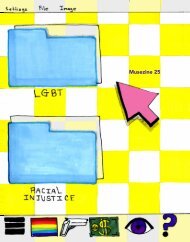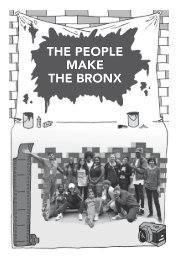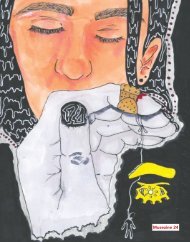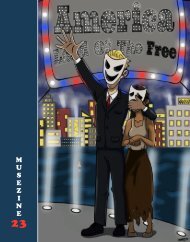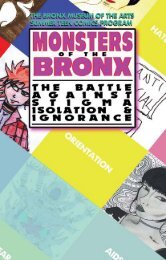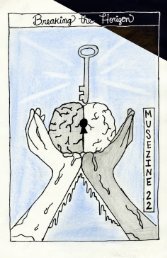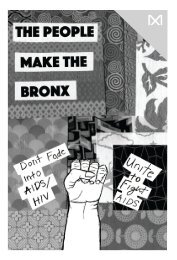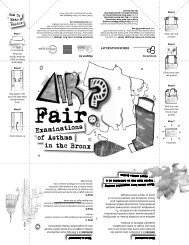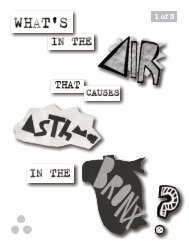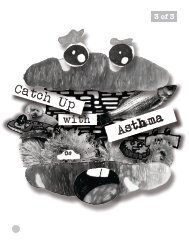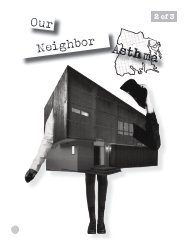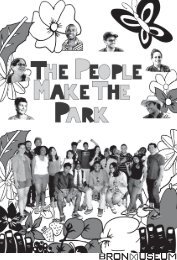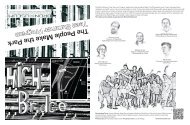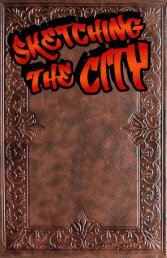Musezine 16
Designed to make contemporary art and culture accessible to urban youth, the Teen Council is structured around the production of MuseCasts, video podcasts available on YouTube, and MuseZines, a graphic publication of original work and commentary, by a small group of high school students working closely with instructors in the Media Lab.
Designed to make contemporary art and culture accessible to urban youth, the Teen Council is structured around the production of MuseCasts, video podcasts available on YouTube, and MuseZines, a graphic publication of original work and commentary, by a small group of high school students working closely with instructors in the Media Lab.
You also want an ePaper? Increase the reach of your titles
YUMPU automatically turns print PDFs into web optimized ePapers that Google loves.
m usez i n e <strong>16</strong><br />
#<strong>16</strong>
M usez i n e<br />
Work by:<br />
Nicol Williams<br />
Hadiza Kassim<br />
Dalena Hoang<br />
Destiny Alvarado<br />
Clarence Killbrew<br />
Onieja Taylor<br />
Kelisha Cyrus<br />
Kwadwo Asamoah<br />
Eric Avila<br />
Alvaro Ceballos<br />
Gertrudiz Mendoza<br />
Jasheah Howard<br />
Brianna Brown<br />
Guest Teen Council<br />
Alumni:<br />
Abiel Wilson<br />
Edited by:<br />
a p r o d uct io n o f: T h e B r o nx M use um<br />
o f t h e A rt s' T een C o un c il.<br />
<strong>16</strong>Created in 2005, the Bronx Museum Teen Council<br />
strives to make contemporary art and culture<br />
accessible to urban youth.<br />
Structured around the production of MuseCasts, and<br />
MuseZines, the Teen Council is comprised of a group<br />
of high school students working closely with two<br />
instructors in the Museum’s Media Lab. Scheduled<br />
concurrently with the school year, this 8-month<br />
program provides teens with an open forum for the<br />
expression of ideas and dialogue on issues affecting<br />
young people, and the promotion of the Bronx as an<br />
important cultural, political and artistic force.<br />
Visit us at:<br />
www.bxmateens.tumblr.com<br />
www.bronxmuseum.org<br />
www.facebook.com/bronxteencouncil<br />
www.youtube.com/bronxteencouncil<br />
Hannie Chia<br />
Hatuey Ramos Fermín<br />
The Bronx Museum of the Arts’ Edcucation Programs and<br />
Teen Council is made possible with support from The Leona<br />
M. and Harry B. Helmsley Charitable Trust, Stavros Niarchos<br />
Foundation, Pierre and Tana Matisse Foundation, The David<br />
Rockefeller Fund, Simón Bolívar Foundation, New York State<br />
Council on the Arts with the support of Governor Andrew<br />
Cuomo and the New York State Legislature; Keith Haring<br />
Foundation, Robert Lehman Foundation; New York Yankees<br />
Community Council; and The Peter Jay Sharp Foundation.
Onieja<br />
collage?<br />
By Onieja Taylor
China Doll<br />
by Dalena Hoang<br />
“Hey, my China Doll.”<br />
He says to me.<br />
I stopped and stared into his windows.<br />
He smiled.<br />
For that moment, he had the universe in the palm<br />
of his right hand and me in his left.<br />
The first second our eyes locked:<br />
China? Chinese? Really?<br />
Okay, I assume that it is your mistake to declare<br />
my ethnicity<br />
Because of my slightly slanted eyes.<br />
Unless you meant...[Sigh]<br />
I do not belong behind closed glass cabinet doors.<br />
Left as a displayed object<br />
Gathering dust<br />
Because I am too delicate to touch<br />
And if you get too close,<br />
It might just crack and crumble.
You can glue it back,<br />
but it will never be the same.<br />
I will not crack, crumble, or fall.<br />
You can’t fix what is not broken,<br />
Can you?<br />
I am not nor will I ever be an empty vessel<br />
for anyone to stuff their unmentionables inside of<br />
me.<br />
I do not need you to brush my hair<br />
Or dress me.<br />
I am capable of standing on my own two feet<br />
Firmly pressed against the ground.<br />
And I will not smile<br />
When I don’t want to.<br />
I am not a manufactured pseudo-ideology<br />
Placed on society<br />
Spreading out like water without a fixed container,<br />
When the world is where it is being contained in.<br />
I will not become the image you have attempted to<br />
mold me into,
An inanimate object cold to the touch.<br />
Your perfection is nonexistence<br />
Just like relationship you’ve began to form in the<br />
back of your mind.<br />
I do not belong to you or any other living being.<br />
I am a human being with rights.<br />
Not the rights that were set<br />
To drown me of my potentials<br />
Because you’re too afraid to see yourself in my<br />
eyes.<br />
I am not a piece of paper<br />
For you to write your name on<br />
And claim me as your possession.<br />
You can spit my name as many times as you want<br />
But I will never obey your demands.<br />
You are as wrong as the Geocentric Theory<br />
If you believed that you had the key to my body.<br />
Like the universe,<br />
I was never yours to begin with.
Interview<br />
Sneak Peek<br />
on<br />
Lady k fever<br />
By Lexandra Ramos<br />
Do you get more respect for being a female artist?<br />
I feel that I do receive more respect. In the beginning I felt that I was<br />
treated as notoriety, kind of cute, like it was a phase or I was doing<br />
it to impress a man. Now I know it is difficult for a lot of people to<br />
understand and to truly respect what I am doing as a female in a<br />
world that is still struggling with the idea of equality.<br />
At what age did you start drawing?<br />
I started drawing as a kid on everything and by everything I mean<br />
walls, furniture, anything I could get my hands on. I started painting<br />
in high school and I was an obnoxious, rebellious art student<br />
challenging the status quo, but my career focus was dance and<br />
theatre. I began to paint graffiti and murals in 1991 when I moved to<br />
Vancouver, Canada.
Who was your inspiration when you started drawing<br />
& who is your inspiration now?<br />
My inspiration to make art was from the traditional side of Art<br />
History. In high school, we studied intensive art history, so I am<br />
thankful to have that foundation. I was inspired by all the greats –<br />
van Gogh, Picasso, Monet, and then I got into Andy Warhol when I<br />
was 14, which lead me into so many other artists, musicians, writers<br />
and poets. My inspirations are now a variety of things and at times<br />
contradictory. From political/social justice issues, to street/hood issues,<br />
fashion, style, oral culture, sexuality issues, emotions, life experiences,<br />
artists and their process, films, theatre, music...<br />
What advice can you give me when it comes to<br />
publishing my work out there & to be known?<br />
Truly understand your worth as an artist and that it takes a lifetime<br />
to understand. Make sure you feel that you are being represented<br />
respectfully and no one is taking advantage of you or your work.<br />
What’s your nationality?<br />
I do not really identify with a nationality. I am first generation<br />
Canadian and I feel as many first generation people do there is<br />
a loss of tradition when adjusting to a new country. I identify with<br />
being a human being and when I fill out applications I always mark<br />
OTHER.
For you was school necessary to be successful in<br />
art?<br />
Yes and no. I studied theatre and film because I felt that I did not<br />
want to go to art school at that time. I did eventually study part-time<br />
and with artists as their studio assistants to get a better vernacular<br />
of my artistic process. I feel and think that going to any type of<br />
post-secondary school is important. A college or university education<br />
provides people with opportunities they might never have had<br />
before. School also allows you to experiment and make mistakes.<br />
What kind of stereotypes do you get about being<br />
an artist?<br />
I have had them all. I have had to re-evaluate everything. What<br />
make me frustrated is most times the stereotypes can come from<br />
the closest people to you. I like to challenge those barriers. I definitely<br />
get stuck into categories that I did not co-sign onto, but I enjoy<br />
being able to show that stereotypes are illusions based on fear. The<br />
fear of success is far greater than the fear of failure.<br />
How did you get a chance to get your work published<br />
throughout Brooklyn & the Bronx?<br />
When I was on the streets, the world was a magical playground;<br />
the alleys provided this embrace of being alive. I had no concept of<br />
making this into a career passion.<br />
Watch the full video interview<br />
www.youtube.com/bronxteencouncil
By Nicol Williams
Continued...
I am my own Stereotype<br />
By Onieja Taylor<br />
“The following students missed detention and<br />
their days have doubled,” is the announcement I<br />
hear every morning during homeroom. As my Dean<br />
calls the names of those students, I realize<br />
that when I’m in detention I don’t really belong<br />
there. Detention is stereotyped as a place<br />
where the “bad students” go when they have done<br />
“bad things”, like disrespecting the teacher or<br />
talking back. When I go to detention I’m there<br />
for lateness, or not having my I.D. Detention<br />
in my school is more like an after school program<br />
rather than an actual punishment.<br />
At the beginning of freshman year in high<br />
school, I went in being a great student. The<br />
deans barely knew me, the teachers described<br />
me as a respectful student and Detention wasn’t<br />
even in my vocabulary. As the months went on<br />
“Sasha Fierce” was one of the names you heard on<br />
the loud speaker daily. “Sasha Fierce, you have<br />
missed detention and your days have doubled.”<br />
“Sasha Fierce please have your planner signed and<br />
report to the Deans office now.” “Sasha Fierce,<br />
you were late and detention will be served on<br />
Friday.” My first experience with “detention”<br />
probably took place in my Religion class. Yes,<br />
my religion class. My teacher seemed to really<br />
have it out for me and I never understood why.<br />
My friend asked me to pass her an empty water<br />
bottle and as I passed it to her, she missed it.<br />
“You have Detention,” the three words I heard<br />
for the first time ever. I was in such awe. I<br />
was never known to get in trouble. As I sat
in Detention that day, I felt like a disrespectful<br />
student. I felt like this was a place<br />
where I knew I didn’t belong. The worst part<br />
was our “punishment”: We had to copy every<br />
word of a newspaper article in SCRIPT and if<br />
we messed up we had to start over. After that<br />
I promised myself that I would never be in<br />
that terrible place again. I guess that didn’t<br />
work.<br />
As freshman year passed, I had multiple encounters<br />
with detention. Sophomore year passed<br />
and I was still in that terrible place. Now<br />
in my junior year, I still have a reserved<br />
spot. Why? As hard as I try to not end up in<br />
that place at the end of my day, somehow my<br />
name still ends up on the roster. My latest<br />
offense: not having my school I.D. I mean it<br />
was my fault that I lost it, but why should<br />
I be punished with having to sit in that room<br />
everyday until I pay for a new one. Everyday<br />
until I purchased a new I.D., my homeroom<br />
teacher repeatedly wrote me a detention slip.<br />
I was forced once again to sit there in that<br />
room to spend countless minutes of my time in<br />
Detention.<br />
Detention, to me, should be a place where<br />
the actual “bad students” go to be punished,<br />
and for the good students like me, we truly<br />
don’t deserve detention. For those students<br />
who actually get good grades and actually do<br />
their work, we should be respected as such.<br />
We shouldn’t be placed upon the same group<br />
of students who essentially disrespect their<br />
teacher, or skip class because it’s those students<br />
that fit the actual stereotype of detention.<br />
But for me, I am my own stereotype.
By Brianna Brown
The Bronx Museum of the Arts<br />
1040 Grand Concourse<br />
D or 4 Train to <strong>16</strong>1st Yankee Stadium<br />
www.bronxteens.weebly.com<br />
education@bronxmuseum.org<br />
718-681-6000 x 132<br />
By Kelisha Cyrus<br />
I cannot stand here and see our mothers weep<br />
Weep over the bodies of sins of our children scream<br />
over the gifts of bullets that envelope itself into the<br />
innocence of our bodies<br />
And pierces the bloody gates of our soul<br />
I cannot stand to see our father’s anger<br />
As we see his daughter kneel on the floor of genocide<br />
To give pleasure to a man she doesn’t even know<br />
As she stands upon mercies pole and strips off each<br />
layer of protection<br />
To show her birthday suit to the men of greed and lust<br />
And I cannot stand to see our parents cry<br />
When they see their children swallow pills of despair<br />
and insecurity<br />
To hide behind the darkness that frees us from the<br />
hate of words that creep at us from every corner
Free museum<br />
Alvaro


